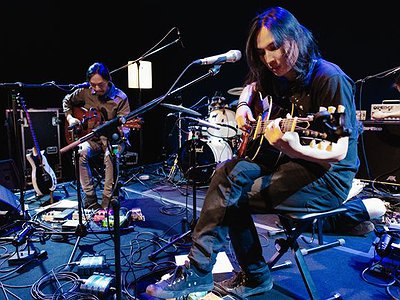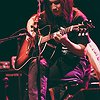Do you feel it important that an audience is able to deduct the processes and ideas behind a work purely on the basis of the music? If so, how do you make them transparent?
I do not think that it is important at all. Music is a sensory experience to be enjoyed and should be left open to interpretation. How it is enjoyed really should not matter. I do not make any attempts to explain my songs beyond sharing the lyrics. People will always find their own meanings in songs. I find that to be the universal charm and beauty of music.
In how much, do you feel, are creative decisions shaped by cultural differences – and in how much, vice versa, is the perception of sound influenced by cultural differences?
Every living thing is influenced by its surroundings. So naturally, differences in geography and culture will factor in when it comes to people's creative processes. How much difference it makes is hard to quantify as every human being is different and unique. They say that music is universal and I agree. I feel that the appreciation of the aesthetics of sound and rhythm still transcends cultural barriers.
The relationship between music and other forms of art – painting, video art and cinema most importantly - has become increasingly important. How do you see this relationship yourself and in how far, do you feel, does music relate to other senses than hearing alone?
Sound and sight both evoke feelings and emotions so when they are well paired, it makes for a fuller and more engaging sensory experience. Having said that, there are also those who feel that this combined presentation is gimmicky and a distraction from a purely aural listening experience. Coming from my background as an interactive designer, I love crafting visuals to sound and vice-versa as much as I love making music. So, at the end of the day, I feel that enjoying the process is all that matters. I feel it is good to have music presented with visuals simply because it opens up more options for it to be shared and enjoyed across today's increasingly connected world.
There seem to be two fundamental tendencies in music today: On the one hand, a move towards complete virtualisation, where tracks and albums are merely released as digital files. And, on the other, an even closer union between music, artwork, packaging and physical presentation. Where do you stand between these poles?
Although sound quality is still not ideal, there's no denying the convenience and accessibility of digital music. It's technological evolution and there's no reason why we shouldn't embrace it. However, I would still prefer music to be presented and packaged as a tangible product (preferably with a free download code in there somewhere). I feel that people tend to cherish the music better when there's something to hold on to.. something that needs to be cared for physically.
The role of an artist is always subject to change. What's your view on the (e.g. political/social/creative) tasks of artists today and how do you try to meet these goals in your work?
I never thought about my craft in that way. The only goal for me is to always create an honest body of work and try to grow creatively in the process. If a song happens to carry a political or social message, it's because my mind was on it then. Songs are personal to me and they encapsulate thoughts and feelings at different stages of my life, there really isn't any agenda beyond that.
Music-sharing sites and -blogs as well as a flood of releases in general are presenting both listeners and artists with challenging questions. What's your view on the value of music today? In what way does the abundance of music change our perception of it?
Digital music distribution gives listeners more options and artists more reach. That's a good thing. I don't think that the value of music has changed much in the sense that quality music will still find a market and hold its value no matter what.
How, would you say, could non-mainstream forms of music reach wider audiences?
The world is already much smaller than it was before, thanks to the increasingly social internet. I can't see how the organic process of sharing new music discoveries amongst friends can be bettered for some time to come.
Usually, it is considered that it is the job of the artist to win over an audience. But listening is also an active, rather than just a passive process. How do you see the role of the listener in the musical communication process?
An artist feeds off audience reactions and tends to perform better and with more spontaneity when the audience is fully engaged. By immersing themselves in the music and responding to the artist positively, everyone comes up tops. If the audience is a passive lot, and the artist fails to win them over, both parties will be denied a full experience, and in some cases, it may even end in tears.
Reaching audiences usually involves reaching out to the press and possibly working with a PR company. What's your perspective on the promo system? In which way do music journalism and PR companies change the way music is perceived by the public?
I've been a DIY musician all along and have never worked with any PR companies before (though Kitchen. Label is helping with the promotion and distribution of my latest album, The Biggest Lie In The World). Although I'm uncomfortable with the whole idea of promotion and media coverage, I do see it as an important part of the music-making process. I guess I'm just sceptical because most times, you have no control of how you are portrayed in the press. Ultimately, it should still always be about the music rather than how it is marketed.
Please recommend two artists to our readers which you feel deserve their attention.
Leslie Low (Singapore) and Neil Hannon of The Divine Comedy (UK).
Read more about Hanging up the Moon at the official website, www.hangingupthemoon.com



